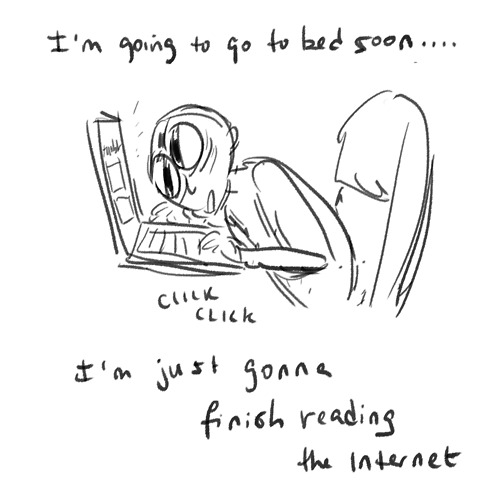My nighttime routine is sacrosanct.
I can't watch television past 9, since the blue light stimulation keeps me up. After my tooth- and skin-care regimens, I lay down with a book and read by a dim light sufficient to see the words but not illuminate my room, since synthetic light suppresses melatonin, the sleep hormone. Providing I am not stressed about anything (dating, posts that need rephrasing, replayed conversation from the day), I can doze off reliably by 10.

If I make it to when my alarm buzzes at 6 is another story, but now with the later sunrises I'm in a good place. But even then, I get sleep deprived from time to time.
There are some who can seize the day without sufficient rest. If I haven't slept, I tell the day to stuff it.
Jane Brody's article, "Cheating Ourselves of Sleep," has the scary message of "harming ourselves with our eyes wide open." There is a veritable laundry list of illnesses spawned by sleep deprivation, longer than the side effects for prescription nasal spray. I can't even tell it over, there are so many. Read it at your own risk of bedtime.
Pretty much every aspect of the body is hit when shut-eye isn't a priority.

Whenever the kiddies visit, I have reasons beyond my desire to finish a sentence when I tuck them in earlier than their scheduled bedtimes. My jet-lagged niece fell asleep this past Shabbos while I read a book (score!) and stayed so for fourteen hours. She was beyond adorable the next day, too.

People have to diagnose themselves when it comes to the type of sleeper they are. Even if I come home late from a wedding, I can't fall asleep unless I read first to slow down my brain, while my brother Owen can simply lay down on his back and not move until morning. In general. I want to hurt him.
Time and awareness is needed to get a good night's sleep, for most. Come to know what individual needs the brain has for optimal dozing off. Keep in mind a steady sleep schedule is vital (go to bed the same time every night); it's often about conditioning.
 |
| Sheldon like to be sung "Soft Kitty." |
7 comments:
I've always wanted to be one of those gifted folks who do fine on 2-3 hours a night instead of the 10-11 I seem to need.
Sure, they do fine until their brains explode. There is no such thing as someone "doing fine" on 2-3 hours a night, not when it comes to their health. Just 'cause they say so, don't make it so.
I manage on 4-5 hours of sleep a night, and make up for it Shabbos. Also, I fall asleep in seconds, usually. I'm just that tired.
If you can condition yourself to enter straight into REM sleep, you can be just as rested in many fewer hours. It's not so much the quantity of your sleep, but the quality. Many times I'll be less tired on 61/2 or 7 hours of sleep than on 8.
FG: Hopefully that's just temporary until you finish college and whatnot. And you are one of those people that can fall asleep when overtired, sigh.
SPDR: How the heck does one condition oneself to specifically enter REM? I just need to focus on falling asleep, just sleep!
Being tired when waking up also has to do with when one wakes up. If one wakes up in middle of REM, one will be sleepy.
Some people's sleep needs vary. Some are fine on 7, some need 8. Others need more. Go forth and diagnose oneself.
I have chronic insomnia. I just can't get to sleep. I'm currently using a sleep aid and I hate that I have to rely on that.
A couple of other things:
I need at least 8 hours a night;
I must read before I go to sleep;
I must not be hungry before I go to sleep;
The big, blazing light has to be on all night. I'm NOT talking about a nightlight. I'm talking full overhead light.
Hm! I find it interesting about the light because artificial light has shown to suppress melatonin, the sleep hormone. However, Dr. Oz once mentioned an "orange bulb," or something like that, in terms of sleep.
http://healthyliving.msn.com/health-wellness/sleep/dr-oz-how-to-sleep-better-1
It deflects the blue light from computers and tvs.
Post a Comment